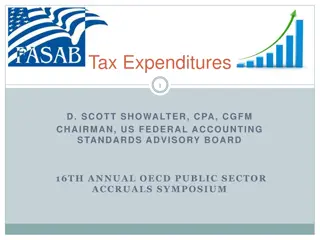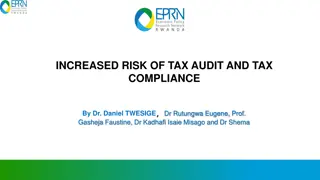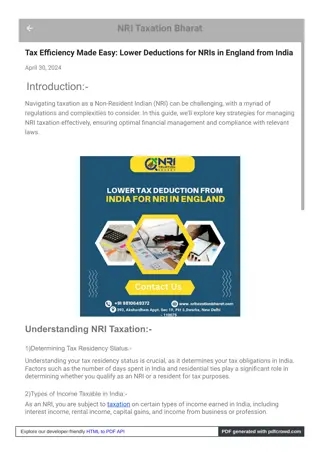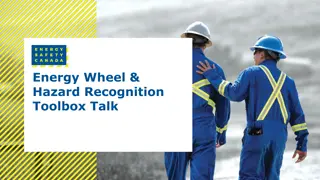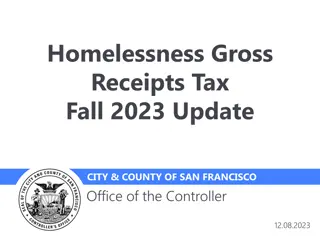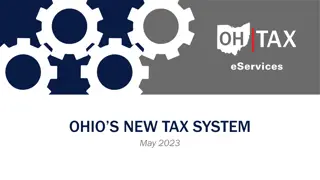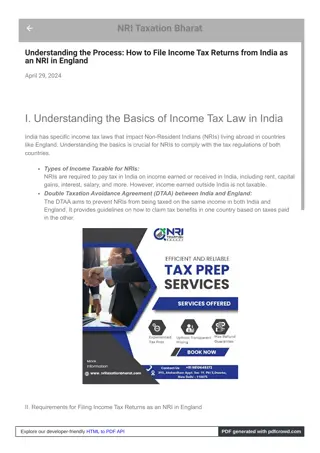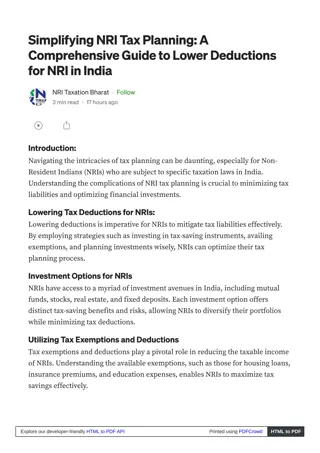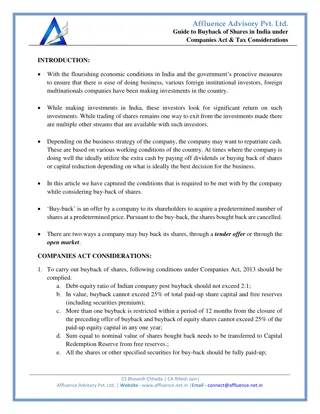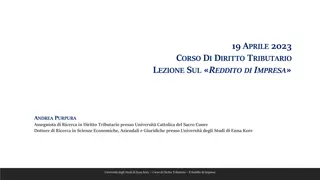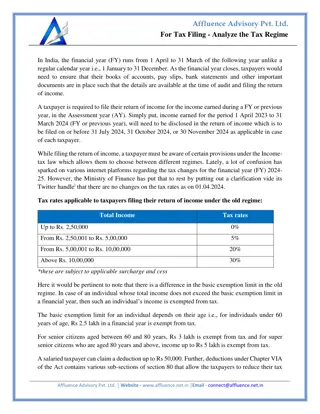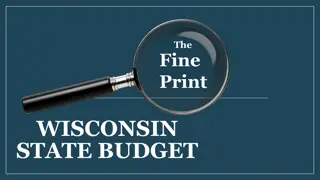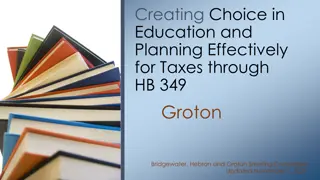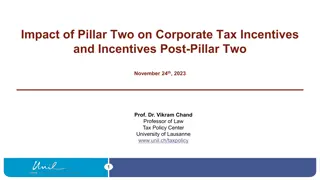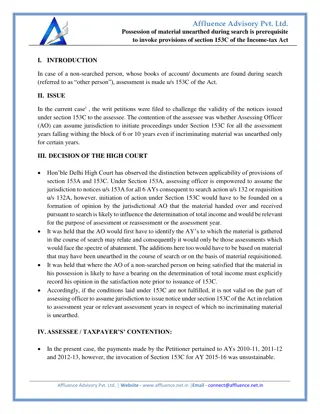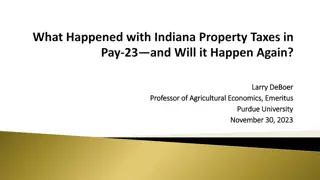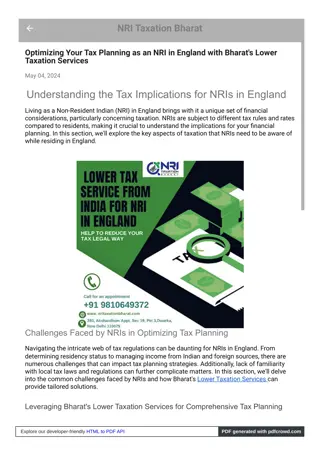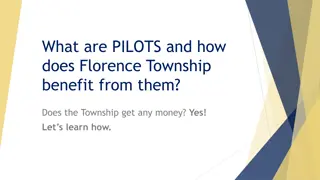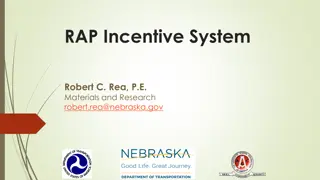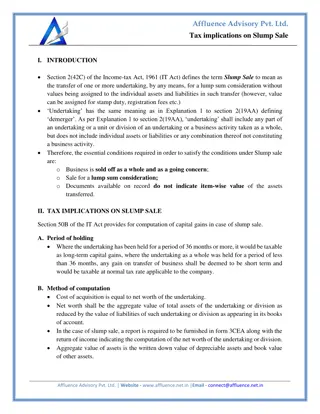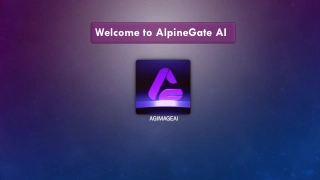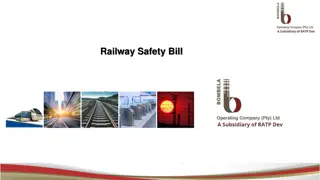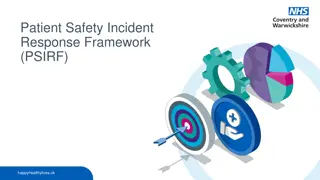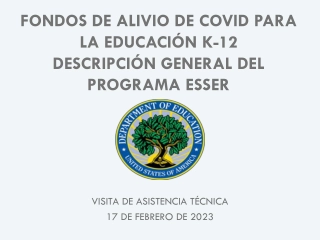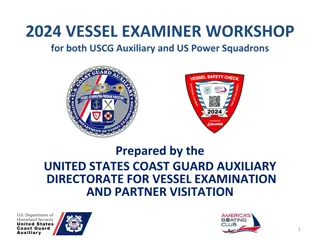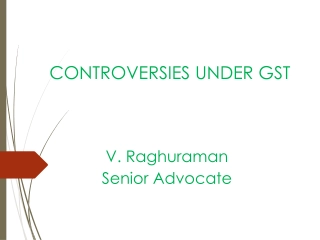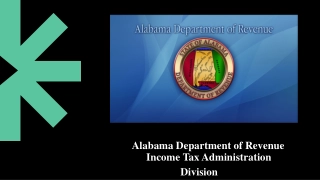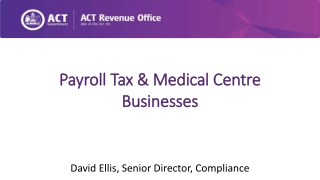Tax Considerations for Incentive, Recognition & Safety Programs
This presentation provides guidelines on tax implications, exemptions, and reporting obligations related to incentive, recognition, and safety programs. It emphasizes the importance of understanding tax considerations for program sponsors and participants to ensure compliance with applicable laws and maximize program benefits. Specific topics covered include income tax-exempt programs, employee income tax considerations, fair market value, tax timing, and sales tax implications.
Tax Considerations for Incentive, Recognition & Safety Programs
PowerPoint presentation about 'Tax Considerations for Incentive, Recognition & Safety Programs'. This presentation describes the topic on This presentation provides guidelines on tax implications, exemptions, and reporting obligations related to incentive, recognition, and safety programs. It emphasizes the importance of understanding tax considerations for program sponsors and participants to ensure compliance with applicable laws and maximize program benefits. Specific topics covered include income tax-exempt programs, employee income tax considerations, fair market value, tax timing, and sales tax implications.. Download this presentation absolutely free.
Presentation Transcript
2023 2024 Tax Considerations for Incentive, Recognition, & Safety Programs Principal Consultant George Delta, ESQ. Counsel to the Incentive Federation, Inc. What you need to know about tax regulations relating to your incentive, recognition & safety programs.
Introduction This presentation offers some general guidelines on the tax implications as well as the tax exemptions for incentive and recognition programs. It will also guide you to more detailed information from industry associations and experts. Incentive, recognition and safety programs are designed to engage eligible participants, improve performance, and encourage loyalty. These programs can excite and motivate eligible participants to take actions the sponsor promotes while simultaneously creating advocates for the company. But it is important to know that each organization and each program is different. This means the tax considerations may be different, too. This document is provided to help guide your tax planning. We encourage anyone developing or implementing either an employee or non-employee program to discuss the situation with your corporate tax attorney to ensure you are meeting all the organization s tax requirements and responsibilities relating to your incentive and recognition programs. The lion s share of the budgets for these programs go to rewarding participants, and rewards have tax implications. Sponsors may be able to deduct the cost of a program, and there may or may not be a tax implication to the participant. Program sponsors must understand these tax implications. First, to protect their own organization by ensuring their program complies with applicable laws. But, also, to understand the tax impact on their program participants to maximize the benefits of their program. 2024 Tax Considerations for Incentive, Recognition & Safety Programs This document is provided to help guide your tax planning. Discuss all your tax requirements for both employee and non-employees with your corporate tax attorney to ensure you are meeting all your tax reporting obligations and your corporate policies and procedures.
Index General Rule of Thumb Income Tax-Exempt Program Employee Income Tax Considerations Who Receives Awards Fair Market Value Tax Timing A Word on Sales Tax 4 5 8 9 - 12 10 11 12 13 2024 Tax Considerations for Incentive, Recognition & Safety Programs This document is provided to help guide your tax planning. Discuss all your tax requirements for both employee and non-employees with your corporate tax attorney to ensure you are meeting all your tax reporting obligations and your corporate policies and procedures.
General Rule of Thumb In most cases, incentive and recognition awards are taxable as income to the award recipient. There are only two specific types of achievement awards that the IRS code states are tax exempt. But there are specific laws and regulations governing these tax-exempt awards. When awards are taxable to recipients, program sponsors must meet IRS reporting requirements for those earning the awards. 2024 Tax Considerations for Incentive, Recognition & Safety Programs This document is provided to help guide your tax planning. Discuss all your tax requirements for both employee and non-employees with your corporate tax attorney to ensure you are meeting all your tax reporting obligations and your corporate policies and procedures.
Income Tax-Exempt Programs Internal Revenue Code Section 274(j) specifies only two types of programs where the awards may be income tax-exempt for the recipient. Service Award Program This program recognizes those who achieve a specific years-of-service milestone. Note: Employee must be celebrating at least five years of service to qualify for favorable tax status, and (s)he can only receive the award once every five years. Safety Achievement Awards issued for safety achievements may also qualify for favorable tax treatment The code requires that specific additional rules be met in order to qualify. 2024 Tax Considerations for Incentive, Recognition & Safety Programs This document is provided to help guide your tax planning. Discuss all your tax requirements for both employee and non-employees with your corporate tax attorney to ensure you are meeting all your tax reporting obligations and your corporate policies and procedures.
Income Tax-Exempt Programs IRS Code Section 274(j) - Employee Achievement Awards This section of the Internal Revenue Code deals specifically preferential tax treatment for Employee Achievement Awards . It states: Employers may take a business deduction for the cost of employee achievement awards . These awards are not taxable to the employee for income or FICA tax purposes. Section 274(j) defines employee achievement awards as given for safety achievement and/or length of service It further defines employee achievement awards as items of tangible personal property . The Code goes on to say, the term tangible personal property shall not include cash, cash equivalents, gift cards, gift coupons, or gift certificates (other than arrangements conferring only the right to select and receive tangible personal property from a limited array of such items pre-selected or pre-approved by the employer), or vacations, meals, lodging, tickets to theater or sporting events, stocks, bonds, other securities, and other similar items. Employee achievement awards must also be awarded as part of a meaningful presentation, and under conditions and circumstances that do not create a significant likelihood of the payment of disguised compensation. Read Incentive Industry Legal and Tax Guidelines to learn more. 2024 Tax Considerations for Incentive, Recognition & Safety Programs This document is provided to help guide your tax planning. Discuss all your tax requirements for both employee and non-employees with your corporate tax attorney to ensure you are meeting all your tax reporting obligations and your corporate policies and procedures.
Income Tax-Exempt Programs IRS Code Section 274(j) - Employee Achievement Awards Section 274(j) does define deduction limitations and other requirements including: The deduction for the cost of an employee achievement award made by an employer to an employee is limited to $400, but it can be increased to $1,600 under an employer s qualified plan. The average deductible cost per employee of all employee achievement awards given pursuant to an employer s qualified written plans in any year cannot exceed $400, however. For service awards that are part of a qualified awards plan, the value of up to $1,600 can be exempt from taxes. A qualified awards plan is an awards program that has official written guidelines, including a list of possible awards and a set of qualifications for each, and does not favor highly compensated employees (defined as employees who are 5% owners of the company either in the current year or prior, or received more than $150,000 in the preceding year). The income limit for the definition of highly compensated employees is indexed to inflation and changes annually.. For all other service awards (those not part of a qualified awards plan), the amount that is exempt from taxes is up to $400. Service awards can only be given every five years of service, at least five years after each previous length-of- service award, and if the employee didn t receive another service award (other than one of very little value) during the same year or any of the previous 4 years. Additionally, the award must be tangible property (for example, a set of golf clubs, a tablet, or a watch). Gifts such as cash, gift cards, paid time off, meals, or event tickets do not qualify. Learn more about qualified and non-qualified plans. Read the Primer on the Federal Income Tax Treatment of Incentive Awards 2024 Tax Considerations for Incentive, Recognition & Safety Programs This document is provided to help guide your tax planning. Discuss all your tax requirements for both employee and non-employees with your corporate tax attorney to ensure you are meeting all your tax reporting obligations and your corporate policies and procedures.
Income Tax-Exempt Programs IRS Code Section 274(j) - Employee Achievement Awards Additional Length of Service Award Requirement(s) To be treated as being for length of service achievement, an award must be awarded after 5 years of employment. Example 1 An employee receives a gift valued at $75 in a qualified plan for achieving 5 years of service. This would fit the tax- exempt criteria. Example 2 An employee receives a $50 gift for achieving 3 years of service. This would be income taxable as it is for less than five years of employment Safety Award Requirement(s) To be considered a safety achievement award and eligible as income tax-exempt, the employer may not reward more than 10% of the eligible employee population A safety award given to a manager, administrator, clerical employee, or other professional employee does not qualify for the income tax exemption, as they are not eligible employees. Learn more about tax implications in the Incentive Industry Legal and Tax Guidelines Also read How to Run a Safety Incentive Program to learn more 2024 Tax Considerations for Incentive, Recognition & Safety Programs This document is provided to help guide your tax planning. Discuss all your tax requirements for both employee and non-employees with your corporate tax attorney to ensure you are meeting all your tax reporting obligations and your corporate policies and procedures.
Employee Income Tax Considerations Any other incentive or recognition award is taxable to the recipient as income. Examples: An employee earns a $250 gift card for submitting a cost reduction idea. This is taxable for the full value of the award. A sales employee receives a $500 merchandise gift for their quarterly sales achievements. This must be reported as taxable income at the fair market value of the award. A dealer sales rep who is not employed by the program sponsor earns a $300 award for achieving their annual sales goal. The IRS would view this as income that must be reported by the dealer sales rep, but this does not require the sponsor to issue a Form 1099 because it is less than $600. A distributor sales manager who is not employed by the program sponsor redeemed $1,000 in awards in a points program. This is taxable income and requires the sponsor to send the participant a Form 1099. Knowing this, sponsors must understand their responsibilities to report awards issued. 2024 Tax Considerations for Incentive, Recognition & Safety Programs This document is provided to help guide your tax planning. Discuss all your tax requirements for both employee and non-employees with your corporate tax attorney to ensure you are meeting all your tax reporting obligations and your corporate policies and procedures.
Who receives awards and how to report? Non-Employees If the recipient of the award is an independent contractor, the fair market value of the award is reported on a Form 1099-MISC, unless the aggregate value of his or her awards is less than $600 in the calendar year. Note: The sponsor is not required to issue Form 1099 to a corporation, unless it is a law firm. Employees If you are rewarding employees, the fair market value of the awards is reported as taxable wages on Form W-2 and is subject to federal and state payroll tax withholding. Note: Most employers will gross-up the value of awards in these programs to help cover all or a portion of the employees tax liabilities Customers The IRS considers credit card points or cash-back programs, airline mileage and hotel frequent guest programs as rebates on purchases rather compensation. Awards from these programs, therefore, are not taxable as income. However, customer awards earned in sweepstakes drawings or other promotional giveaways are considered taxable income. The fair market value of these awards should be reported on Form 1099- MISC, unless the aggregate value is less than $600 in the calendar year. 2024 Tax Considerations for Incentive, Recognition & Safety Programs This document is provided to help guide your tax planning. Discuss all your tax requirements for both employee and non-employees with your corporate tax attorney to ensure you are meeting all your tax reporting obligations and your corporate policies and procedures.
Fair Market Value Fair market value is a term that applies to merchandise and travel awards. The fair market value of the award must be reported as taxable income to the award recipient. But how is fair market value calculated? Travel Awards Merchandise Awards One survey found sponsors calculate fair market value as 70% of the sales price. The 30% discount reflects marketing & fulfillment services retailers do not incur. These costs include: Ongoing management of the program Tracking and evaluating results for the program Merchandising services The attention given to each order and its processing The survey also determined that fair market value would be 75% of the land travel cost. No discount for air travel The 25% discount reflects costs an individual would not incur These costs include: Tour directors Name tags and other customized materials Food and beverages provided to a group No administrative charges for special services. The fair market value for awards like gift cards or gift certificates with an explicit dollar value cannot be discounted. Review Successfully Navigating Reward and Recognition Incentive Program Tax Concerns to learn more about employee income tax implications and fair market value. 2024 Tax Considerations for Incentive, Recognition & Safety Programs This document is provided to help guide your tax planning. Discuss all your tax requirements for both employee and non-employees with your corporate tax attorney to ensure you are meeting all your tax reporting obligations and your corporate policies and procedures.
Income Tax Timing IRS regulations require reporting of appropriate income taxes. Employee income tax earnings are typically reported during the pay period when employees receive the award. In the case of a gift card or other cash equivalent offering, this typically means the value is reported during the pay period when they receive the award. Their regular withholdings are deducted for the value of the award. Points programs may be a bit more complicated. Points are taxable upon receipt, however, if the total amount of points received is not enough to be redeemed for any item, the points have no value. It is improper to wait until redemption to tax points. Many organizations only apply the value of the items redeemed and report them once annually to be added to the employee s W-2 for income tax reporting Travel earnings are normally reported after the trip is earned and added to the employee s W-2. Non-Employees and customer earnings are sent annually via a 1099 when they earn over $600 or more in fair market value for the awards. This requires a sponsor to collect either their Social Security or Tax ID number to meet their annual reporting obligations. 2024 Tax Considerations for Incentive, Recognition & Safety Programs This document is provided to help guide your tax planning. Discuss all your tax requirements for both employee and non-employees with your corporate tax attorney to ensure you are meeting all your tax reporting obligations and your corporate policies and procedures.
A Word on Sales Taxes A sales tax is a form of consumption tax imposed by the state, county, or municipal government on the sale of goods and services. Incentive, recognition and safety awards may be subject to sales taxes depending on the state, county, or city where the award will be shipped. Sales taxes must be collected by the award provider and remitted to the appropriate state, county or municipality based the shipping address of the award. In most cases, the award will be shipped to either the home or worksite of the recipient. Items shipped to their home or workplace would be subject to their state and local sales taxes. If this participant lived in Buffalo, New York, sales taxes for their Buffalo addresses would be added to the award. Sales taxes are added based on the ship-to address of the award. To protect sponsors, incentive award providers charge the appropriate sales tax and remit them to the appropriate governing body. Gift cards and other cash-value awards do not require the provider to add and remit sales tax since the retailer accepting the card will add sales tax at the point of purchase and remit them to the appropriate government entity. Remember, sales taxes are a consumption tax imposed by the state, county or municipal government. Income taxes are charged to the award recipient by the federal or state government based on their total income. 2024 Tax Considerations for Incentive, Recognition & Safety Programs This document is provided to help guide your tax planning. Discuss all your tax requirements for both employee and non-employees with your corporate tax attorney to ensure you are meeting all your tax reporting obligations and your corporate policies and procedures.
Additional Resources for Further Information Primer on the Federal Income Tax Treatment of Incentive Awards. George Delta, Esq. December 5, 2019. Incentive Marketing Association, 2018 Tax Laws & Effects on Recognition and Incentive Programs. Presenter: George Delta, Category Legal Council Expert & Moderator: Brant Dolan, CPIM, Quality Incentive Company, IESP President. 2018 Incentive Federation. Incentive Industry Legal and Tax Guidelines. Steve Slagle, Managing Director, Incentives Federation, Inc. Successful Meetings. How to Run a Safety Program. Presenter: George Delta, Council to the Incentive Federation. 2016. Perks.com. Successfully Navigating Reward and Recognition Incentive Program Tax Concerns. Steve Timmerman, Co-Founder Perks.com and George Delta, Council to the Incentive Federation. 2015. 2024 Tax Considerations for Incentive, Recognition & Safety Programs This document is provided to help guide your tax planning. Discuss all your tax requirements for both employee and non-employees with your corporate tax attorney to ensure you are meeting all your tax reporting obligations and your corporate policies and procedures.
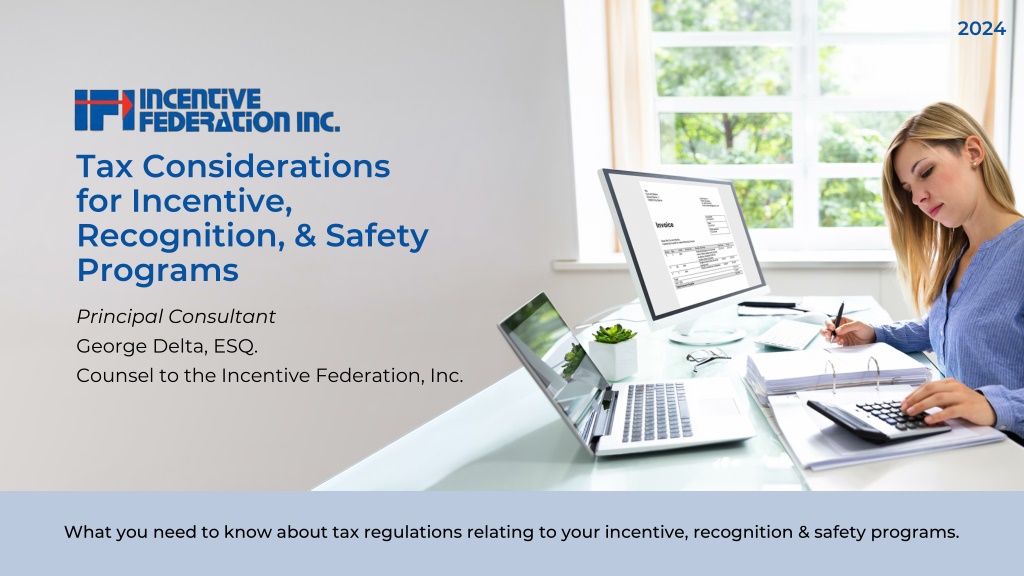

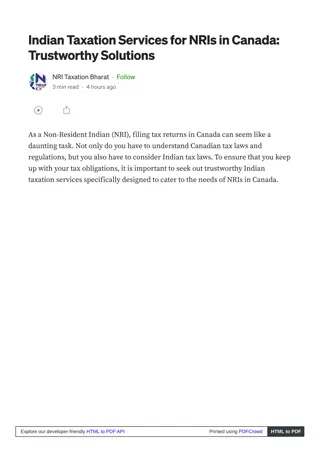
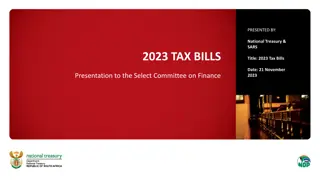
![Town of [Town Name] Real Estate Tax Rates and FY 2024 Budget Summary](/thumb/62211/town-of-town-name-real-estate-tax-rates-and-fy-2024-budget-summary.jpg)

